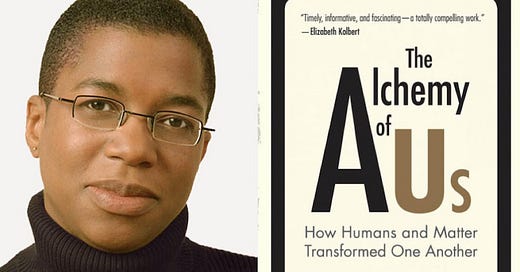Review: Priyamvada Natarajan on Ainissa Ramirez and Modern-Day Alchemy
The human desire to transmute matter dates back to ancient civilizations across the globe and was actively pursued in medieval and early modern times as alchemy, the pre-scientific ancestor of modern-day chemistry. Alchemy’s relationship to chemistry is akin to astrology’s relationship to astronomy, both attempting to connect the terrestrial with the celestial. Alchemy’s goal of metallurgically transforming baser metals into gold combined the concrete and the esoteric: alchemists understood this sought-after transformation as a purification, a route to immortality and the divine. Descending from these early experiments, modern materials science, which also attempts to manipulate and reshape matter, underpins most, if not all the technological innovations that have come to define our lives today.
In a recent book, titled The Alchemy of Us: How Humans and Matter Transformed One Another, the engineer, inventor, and science writer Ainissa Ramirez considers eight key inventions—clocks, rails, copper cables, photographic film, light bulbs, hard disks, scientific glassware, and silicon chips, examples from materials science of how humans altered matter into usable inventions that in turn shaped culture in both intended and unintended ways. Take, for example, the fabrication of steel and the Bessemer process that catalyzed railways and led to new levels of movement of people and goods across the world, interconnecting us to a previously unimaginable degree. Or the invention of chemically enriched glasses like heat-resistant borosilicate, which not only enabled new advances in chemical laboratories but also transformed how we cook and eat at home. Ramirez has meticulously tracked down the hidden histories of many unacknowledged originators who got written out of the narratives of discovery of these new materials. These include Reverend Hannibal Goodwin of Newark, New Jersey, who invented a process for making thin and flexible photographic film two years before Eastman Kodak did, and William Wallace, who created an arc-light system in a Connecticut workshop that Thomas Edison visited in 1878, becoming excited by the discovery and developing it into the electric lightbulb.
Start a conversation with Mom about books!
Book Post for Mother’s Day
In the past several decades, with the rise of academic disciplines studying technology and society, we have become more attentive to the impact of invention on our day-to-day lives. The disastrous consequences of the scientific achievement of taming the atom, leading to the destruction of Hiroshima and Nagasaki, forced scientists to recognize that scientific exploration does not occur in a vacuum and can have profound real-world consequences. The terror unleashed by nuclear weapons that caused the death of more than a hundred thousand innocent Japanese civilians led to the call by Bertrand Russell and Albert Einstein in 1955 for world leaders to seek peaceful solutions to international conflicts. This catalyzed the Pugwash Conferences on Science and World Affairs that convenes to this day aiming to eliminate nuclear weapons.
Ramirez draws out the unanticipated applications of these eight discoveries and the vast improvement they wrought in our lives as well their unimagined costs. One chilling example she discusses is the use of Polaroid’s instant photography technology by the apartheid regime in South Africa to track and control the movements of Black South Africans. She chronicles the formation in 1970 of the Polaroid Revolutionary Workers Movement in the United States, which eventually led the Polaroid company to pull its business out of South Africa. The Polaroid movement prefigures contemporary ethical challenges to technology such as biases in facial recognition that have led to the creation of organizations like the Algorithmic Justice League.
By making inventors human, highlighting their talents as well as shortcomings, Ramirez hopes she will connect readers with inventors’ experiences and see their own capacities to innovate. The American Association for the Advancement of Science recently recognized her success in doing so with their Subaru Prize for the Excellence in Science Books. She makes a persuasive case that we must pay mind to the unexpected consequences of our material transformations and remain watchful of all possible uses of what may appear to be innocuous innovations. These clever transformations of inanimate matter, fruits of modern-day alchemy, are not inherently neutral; they embed within them the aspirations and limitations of their makers. This extremely timely book should be required reading for all as technology transforms our world at an ever-accelerating pace.
Priyamvada Natarajan is a Professor in the Departments of Astronomy and Physics at Yale and the Sophie and Tycho Brahe Professor at the Dark Cosmology Center, Niels Bohr Institute, at the University of Copenhagen, Denmark. She is the author of Mapping the Heavens: The Radical Scientific Ideas That Reveal the Cosmos. She was the first woman in Astrophysics to be elected a fellow of Trinity College, Cambridge.
Among many scientists, Priyamvada Natarajan supports temporary patent suspension for Covid-19 vaccines in light of the on-going humanitarian crisis in India. She encourages us to give if able here.
Book Post is a by-subscription book review service, bringing book reviews by distinguished and engaging writers direct to your in-box, as well as free posts from time to time to those who follow us. Thank you for your subscription! Your support supports our writers and our effort to grow a common reading culture across a fractured media landscape. Coming soon: John Banville on Jonathan Meiburg’s A Most Remarkable Creature; Rosanna Warren on Edmund de Waal’s Letters to Camondo.
Astoria Bookshop in Queens, NY, is Book Post’s Spring 2020 partner bookstore! We support independent bookselling by linking to independent bookstores and bringing you news of local book life as it happens in their aisles. We’ll send a free three month subscription to any reader who spends more than $100 there during our partnership. Send your receipt to info@bookpostusa.com.
Follow us: Facebook, Twitter, Instagram
If you liked this piece, please share and tell the author with a “like”




